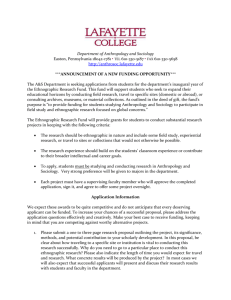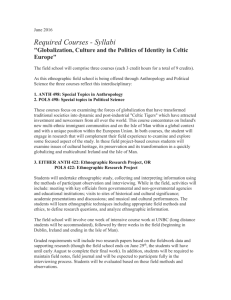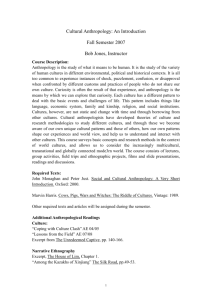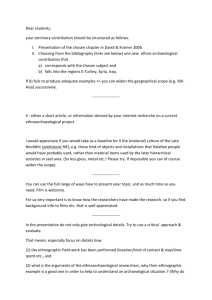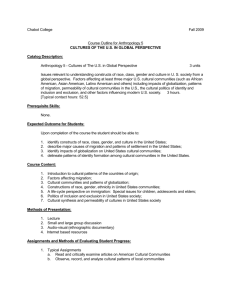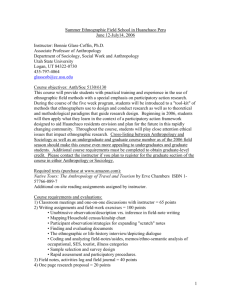MODULE SPECIFICATION TEMPLATE
advertisement
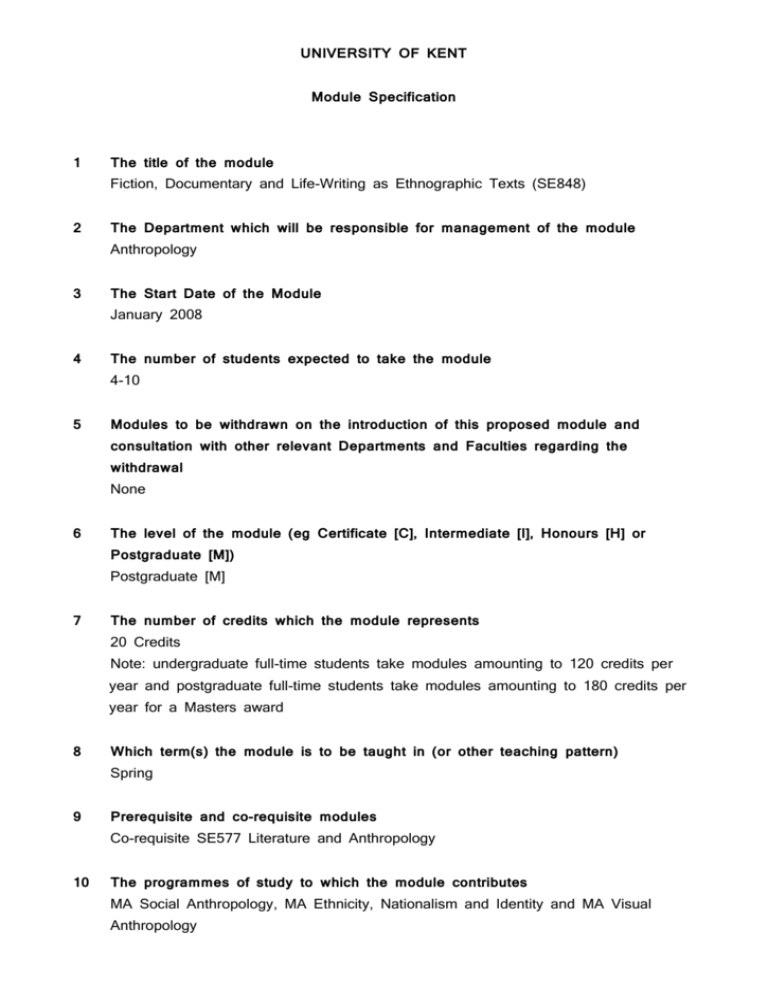
UNIVERSITY OF KENT Module Specification 1 The title of the module 2 The Department which will be responsible for management of the module 3 The Start Date of the Module 4 The number of students expected to take the module 5 Modules to be withdrawn on the introduction of this proposed module and Fiction, Documentary and Life-Writing as Ethnographic Texts (SE848) Anthropology January 2008 4-10 consultation with other relevant Departments and Faculties regarding the withdrawal None 6 The level of the module (eg Certificate [C], Intermediate [I], Honours [H] or Postgraduate [M]) Postgraduate [M] 7 The number of credits which the module represents 20 Credits Note: undergraduate full-time students take modules amounting to 120 credits per year and postgraduate full-time students take modules amounting to 180 credits per year for a Masters award 8 Which term(s) the module is to be taught in (or other teaching pattern) 9 Prerequisite and co-requisite modules 10 The programmes of study to which the module contributes Spring Co-requisite SE577 Literature and Anthropology MA Social Anthropology, MA Ethnicity, Nationalism and Identity and MA Visual Anthropology 11 The intended subject specific learning outcomes and, as appropriate, their relationship to programme learning outcomes On the completion of this module students will be able: To identify the criteria for assessing the reliability of non-standard ethnographic sources as anthropological evidence To discuss critically a range of fictional material containing anthropological information To review critically to at least two works of life-writing To compare using examples textual and visual representations of the same society. This module builds upon the advanced discussions of the first term’s work on The masters’ programmes by requiring students critically to examine alternative sources of ethnographic information of the kind frequently mentioned in the critiques presented by the new anthropology. 12 The intended generic learning outcomes and, as appropriate, their relationship to programme learning outcomes The anticipated generic outcomes are that students on the completion of this module will be able: To appraise the value of different kinds of representative descriptions in anthropology. To compare and contrast different epistemological approaches to the understanding of human societies To discuss abstract arguments at a high level of sophistication with their peers. The module will be an optional one within the programmes to which it contributes and will provide the opportunity for students in different programmes to identify issues which they 13 share in relation to problems of ethnographic representation. A synopsis of the curriculum The major part of the curriculum is identical to that of SE577 (a stage 3 module in the department’s UG programme) which is a co-requisite, though Masters students have advanced learning outcomes which are taught and assessed in ways supplementary to the UG module. Students will be expected to read specific texts each week relating to the theme of ethnographic representation. Some of these texts will be novels and short stories written by anthropologists, some ill be novels or plays written with the intention of providing ethnographic descriptions. Other texts will comprise biographies and autobiographies and various forms of life-writing. Analysis of fictional and ethnographic films will also from a substantial part of the module. In discussing each text theoretical issues will be raised concerning the reliability of the texts as documents and how valid conclusions can be drawn inform them in relation to social and cultural matters. 14. Indicative Reading The list of texts and films may vary from year to year but the following can be considered indicative of the range of materials which will be discussed: The Antigone (with Robin Fox’s commentary); Pather Panchali. Katy Gardner “Songs From the Rver’s Edge”; “Nisa”; J.M.Synge: ‘The Aran Islands” and Flaherty’s “Man of Aran; “Max Havelaar”. David Lan’s plays. 15 Learning and Teaching Methods, including the nature and number of contact hours and the total study hours which will be expected of students, and how these relate to achievement of the intended learning outcomes The total study hours are 160. There will 12 x 2hr classes (as currently taught in SE 577 which students will attend) and 2x I hr individual tutorials for each Masters student. 16 Assessment methods and how these relate to testing achievement of the intended learning outcomes These will be as follows: 1 short review (350 words) of a fictional written text – novel or short story (15%) –testing the level of critical analysis 1 short review (350 words) of a film which has an ethnographic dimension (15%) – testing the ability to identify reliable ethnographic data contained in a film 1 review (500 words) of a biographical or autobiographical anthropological text.(15%) – testing the ability to link individual statements with valid generalisations on cultural issues. (Additional to UG requirement) 1 (2000 word) essay relating to the content of the module on a subject chosen after discussion in tutorials. (45%) –testing an ability to bring together theoretical ideas from anthropology to bear on non-standard ethnographic material. An assessment of the relevantly informed oral contribution and regular attendance of the student by the module convenor (10%) – testing the ability of students to participate in an informed and critical manner in discussions of prescribed material. 17 Implications for learning resources, including staff, library, IT and space Given the small numbers expected to register fro this module there are no major implications for learning resources for this module. 18 A statement confirming that, as far as can be reasonably anticipated, the curriculum, learning and teaching methods and forms of assessment do not present any non-justifiable disadvantage to students with disabilities No disadvantages for students with disabilities are anticipated in relation to the curriculum, learning teaching methods and forms of assessment in this module. Statement by the Director of Learning and Teaching: "I confirm I have been consulted on the above module proposal and have given advice on the correct procedures and required content of module proposals" ................................................................ Director of Learning and Teaching .............................................. Date Statement by the Head of Department: "I confirm that the Department has approved the introduction of the module and will be responsible for its resourcing" ................................................................. Head of Department .............................................. Date


